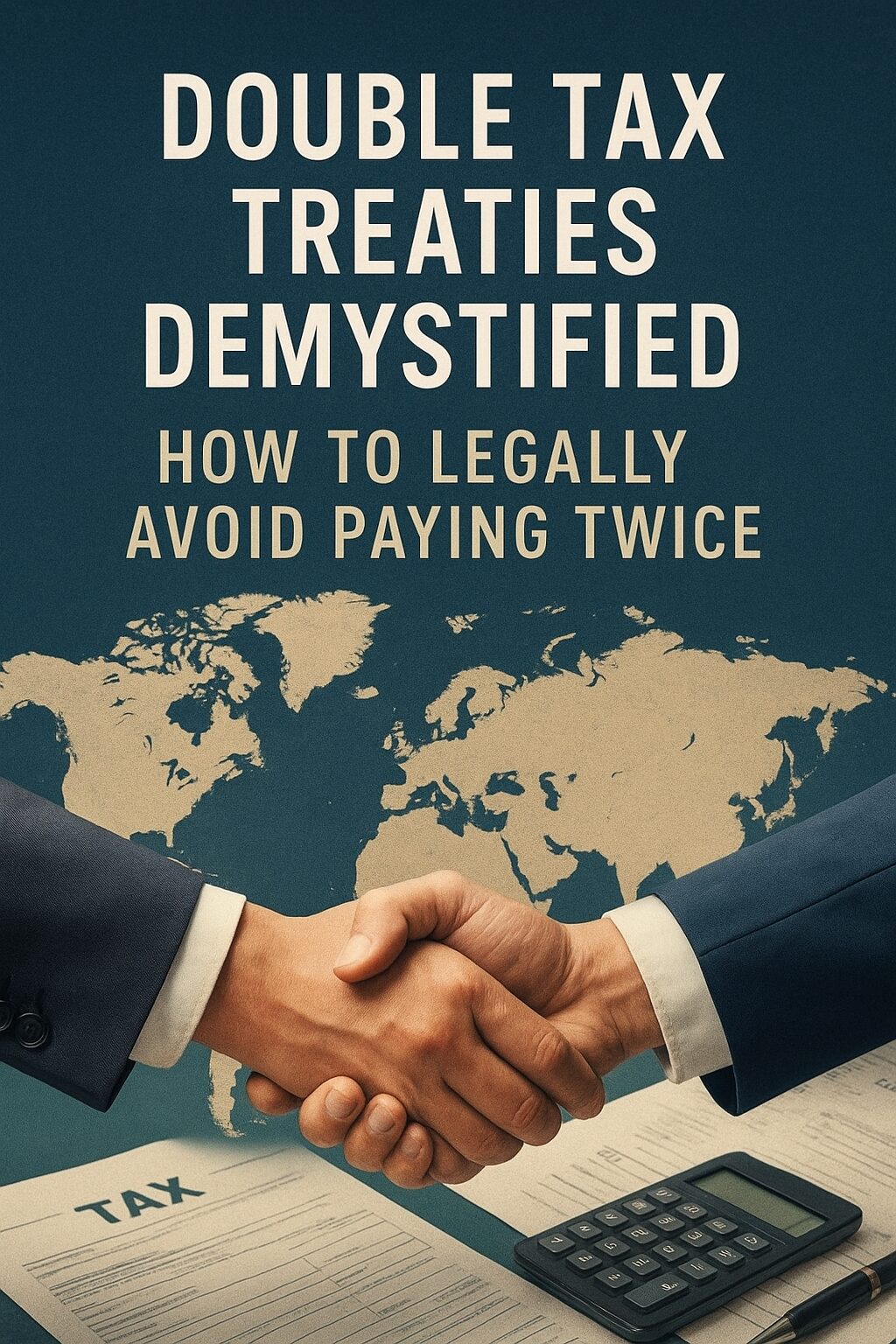The Global Tax Puzzle
For global investors, digital nomads, and entrepreneurs, the greatest risk is not political instability or market collapse—it is tax inefficiency. Without careful planning, you may face double taxation: being taxed in two countries on the same income.
This is where Double Tax Treaties (DTTs) come in. These agreements between countries define where, how, and to what extent income is taxed. Properly leveraged, they allow wealthy individuals and corporations to legally avoid paying twice, reduce tax rates, and even unlock cross-border tax exemptions.
In this definitive guide, we’ll break down the mechanics of DTTs, how they apply to real-world cases, the most favorable treaties, and the strategies that high-net-worth individuals (HNWIs) use to engineer global wealth structures.
1. What Is a Double Tax Treaty (DTT)?
1.1 Definition
A Double Tax Treaty (also called a Double Taxation Agreement – DTA) is a bilateral agreement between two countries designed to prevent income from being taxed twice.
1.2 Purpose
- Avoid double taxation on income earned in both countries.
- Clarify tax residency rules.
- Lower withholding taxes on dividends, interest, and royalties.
- Encourage cross-border investment by reducing uncertainty.
1.3 Scope of Coverage
- Income tax
- Corporate tax
- Dividends, royalties, and interest
- Pensions
- Capital gains
2. Key Principles of Double Tax Treaties
2.1 Residency vs. Source Principle
- Residency Principle: The country of residence taxes worldwide income.
- Source Principle: The country where income is generated taxes that income.
- DTTs reconcile these principles to avoid duplication.
2.2 Tie-Breaker Rules for Residency
If you qualify as a tax resident in both countries, treaties establish tie-breaker rules:
- Where is your permanent home?
- Where are your vital interests (family, business)?
- Where do you habitually reside?
- If still unclear, nationality or mutual agreement decides.
2.3 Elimination Methods
- Exemption Method: One country exempts the income from tax.
- Credit Method: Taxes paid abroad are credited against domestic tax liability.
3. Practical Benefits of DTTs
3.1 Lower Withholding Taxes
Example: A US investor receives dividends from a UK company.
- Without a treaty: Withholding tax may be 30%.
- With a treaty: Reduced to 5–15%.
3.2 Avoidance of Double Taxation on Pensions
Example: A retiree living in Portugal with pensions from Germany.
- Treaty allocates taxation rights, often giving advantage to residence country.
3.3 Business Profits and Permanent Establishment
DTTs define what constitutes a “permanent establishment.”
- Protects entrepreneurs from being taxed in a foreign country simply for having a representative office.
4. Top Countries with Extensive DTT Networks
- United Kingdom: 130+ treaties, global coverage.
- Netherlands: Extensive treaties, often favorable for corporate structures.
- Luxembourg: Strategic hub for investment funds and holding companies.
- Singapore: 90+ treaties, Asia-Pacific hub.
- United Arab Emirates (UAE): Growing network, highly beneficial given zero tax regime.
5. Real-World Strategies Using DTTs
5.1 Dividend Optimization
- An investor in Dubai holding shares in a German company.
- UAE–Germany DTT reduces withholding tax → Dubai residency = 0% tax.
5.2 Royalty and IP Planning
- Tech entrepreneur domiciles IP in Ireland.
- DTTs reduce royalties withholding tax when licensing to US, EU, or Asia.
5.3 Pension Relocation
- Retiree with UK pensions moves to Portugal under NHR regime.
- Treaty ensures pension taxed at reduced rates or exempt in Portugal.
5.4 Expatriate Executives
- American living in Singapore avoids double taxation on salary through the US–Singapore treaty + Foreign Earned Income Exclusion (FEIE).
6. Risks and Limitations
- Treaty Abuse & Anti-Treaty Shopping Rules
- OECD’s BEPS initiative restricts aggressive treaty use.
- Residency Misinterpretation
- Spending time in multiple countries may still create dual residency conflicts.
- Changing Rules
- Treaties can be renegotiated; favorable clauses may disappear.
- Complex Compliance
- Treaty benefits often require specific forms, residency certificates, and tax filings.
7. Case Studies
- Case 1: Investor in UAE
- Leveraged UAE–India treaty to minimize dividend withholding tax. Saved millions annually.
- Case 2: European Family Office
- Structured investments through Luxembourg to take advantage of favorable treaty with Brazil.
- Case 3: Retired Couple in Portugal
- Received pensions from France under DTT exemption clause. Tax-free income for 10 years.
8. The Future of Double Tax Treaties
- OECD Pillar Two (Global Minimum Tax): Targets corporate tax avoidance, but individuals may face spillover effects.
- Digital Nomad Growth: Countries are reevaluating DTTs for remote workers.
- Geopolitical Tensions: Some treaties suspended (e.g., Russia and OECD nations).
9. Strategic Framework for Investors
To maximize DTT benefits:
- Choose your tax residency country wisely (UAE, Portugal, Singapore).
- Map out existing treaty networks of that country.
- Align income streams (dividends, royalties, pensions) with treaty advantages.
- Consult international tax advisors for compliance.
Conclusion: Legally Paying Less, Not Twice
Double Tax Treaties are one of the most powerful yet underutilized tools in global wealth planning. They allow you to:
- Legally reduce tax rates on cross-border income.
- Prevent dual taxation on pensions, business profits, and investments.
- Create structures that multiply wealth preservation.
The wealthiest global citizens use treaties not as loopholes but as foundational structures for global tax optimization. In a world where every percentage saved compounds over decades, treaties are the difference between losing wealth to governments and preserving it for generations.
